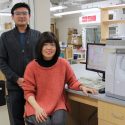MATC, UW collaborate on biodiesel fuel reactor
Madison Area Technical College today dedicated its new biodiesel reactor, built in partnership with the University of Wisconsin–Madison, to produce motor fuel blended from waste vegetable oil and methanol.
The reactor will be used to educate MATC students in the production, use and quality control of biodiesel fuels and the maintenance of biodiesel-fueled engines and vehicles and promote the use of biofuels across Wisconsin.
“As high gas prices create growing interest in energy alternatives, training the workforce for emerging industries like biodiesel is one way MATC can help fuel our economy,” says MATC President Bettsey Barhorst.
UW–Madison engineering students designed and built the laboratory-scale reactor at the request of MATC’s Diesel Equipment Technology associate degree program.
“Biodiesel is also an environmentally friendly fuel,” says Stephanie Britton, a UW–Madison materials science graduate student who is completing a teaching internship at MATC. “Because the oils used to make biodiesel come from agricultural crops, combustion of the fuel has zero net carbon dioxide emissions. This reduces greenhouse gases and helps address global warming.”
At a news conference and dedication ceremony at MATC’s Truax location in Madison, students and faculty from the two colleges demonstrated how the reactor purifies cooking oil recovered from a restaurant’s deep fryer and blends it into a fuel that can operate a diesel-powered vehicle without engine modifications. A semi truck running on biodiesel fuel was then driven through a ceremonial banner, officially dedicating the reactor.
“This is an exciting project, not only because it advances a promising energy technology, but because it’s a timely collaboration between UW–Madison and MATC to address a statewide concern,” says UW–Madison Chancellor John Wiley, who participated in the ceremony.
The biodiesel product will be used to fuel stationary diesel engines and diesel powered vehicles operated by MATC students. These engines will be monitored for scheduled oil sampling, five gas emissions testing, and periodic engine wear according to industry standard practices.
“The goal is for students to synthesize and study various biodiesel fuel blends,” says project director Ken Walz, an MATC chemistry instructor. “The reactor will allow students to experiment with different feedstocks, catalysts, and processing temperatures to optimize biodiesel production. Students will then characterize the fuel that they produce, to measure various properties such as specific gravity, viscosity, flash point, and oxidative stability.”
Wisconsin Agriculture Secretary Rod Nilsestuen adds: “Biodiesel is a key part of state government’s strategy to promote clean, renewable energy alternatives that will generate jobs and reduce our dependence on fossil fuels. Our university and technical college systems are important partners in that effort.”
The Biodiesel reactor project was conceived by MATC’s Consortium for Education in Renewable Energy Technologies (CERET). CERET is a National Science Foundation-funded initiative to develop curriculum for renewable energy instruction in colleges and high schools and provide hands-on renewable energy workforce training.
UW–Madison is involved in research on numerous bioenergy and alternative fuel projects. In addition, more than 100 engines on campus that have been using a B20 biodiesel blend since January 2005.
Tags: biosciences, business, research



